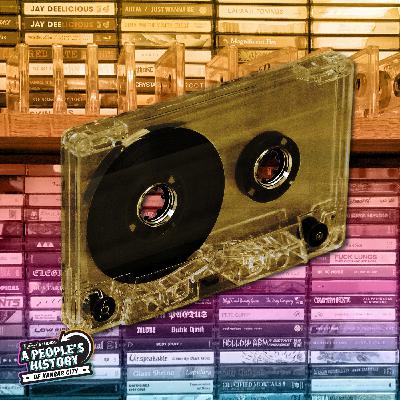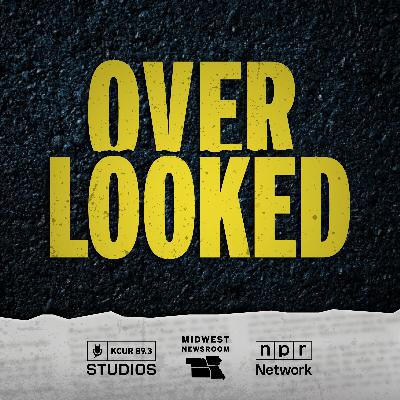Discover A People's History of Kansas City
A People's History of Kansas City

A People's History of Kansas City
Author: KCUR Studios
Subscribed: 214Played: 3,245Subscribe
Share
Description
The podcast about the everyday heroes, renegades and visionaries who shaped Kansas City and the region. If these stories aren't told, they're in danger of fading into the past. Made by Suzanne Hogan and Mackenzie Martin.
46 Episodes
Reverse
70 years ago, the U.S. Supreme Court ruled that racial segregation in public schools was unconstitutional in its landmark decision Brown v. Board of Education. But the case may have played out differently if it hadn’t been for a tenacious group of women in Johnson County, Kansas, who led their own integration lawsuit five years earlier. As Mackenzie Martin reports, the case centered around a two-room schoolhouse and included a lengthy boycott, big-shot NAACP lawyers, FBI surveillance — and six very brave children.
Cassette tapes could have remained a relic of the 1970s and 80s. But against all odds, they’ve survived the eras of CDs and streaming to win over music lovers of a new generation. That’s in large part thanks to the National Audio Company in Springfield, Missouri, the largest cassette manufacturer in the world. Suzanne Hogan shares the story of how this proudly analog format found a new life.
Oreo is the best-selling cookie in the world today. But few people remember the product that Nabisco blatantly ripped off: Hydrox. A creation of Kansas City’s Loose-Wiles Biscuit Company, Hydrox was billed as the “aristocrat of cookies,” with a novel combo of chocolate and cream filling. So why, more than a century later, is Hydrox still mistaken as a cheap knockoff? Producer Mackenzie Martin documents the rise and fall of America’s first chocolate sandwich cookie.
Did you know that a certain cream-filled black and white sandwich cookie got its start right here in Kansas City? And no, we're not talking about the Oreo.A People's History of Kansas City is hosting a special live event on March 1, 2024, where host Suzanne Hogan and producer Mackenzie Martin will take you back to the birth of the very first: Hydrox. Hear our next episode before everyone else. Go to KCUR.org/cookies for tickets.
In the early 1900s, the three Conley sisters barricaded themselves in a Wyandot cemetery in downtown Kansas City, Kansas, to save it from destruction. Then Lyda Conley took the battle all the way to the U.S. Supreme Court — the first Indigenous woman to do so. In this episode, which originally aired in 2020, Suzanne Hogan uncovers Conley’s story and reports how the Kansas City arts community is newly celebrating her legacy.
In the late 1970s, a group of musicians in Topeka, Kansas formed what became one of the first all-women mariachi bands in the country. Mariachi Estrella broke down barriers in a male dominated music scene, before a deadly disaster almost ended the group for good. Suzanne Hogan tells how the band’s descendants are ensuring their legacy shines on, decades later.
When hip-hop first hit Kansas City streets, the effect was immediate. The new sound took over record stores, local high schools and underground dance parties. As America celebrates a half century of hip-hop, KCUR’s Lawrence Brooks IV honors Kansas City’s own contributions to the culture.
In 1948, Phillip Sollomi debuted an Italian vinaigrette at his Kansas City fried chicken restaurant, the Wishbone. An immediate hit, the salad dressing formed the foundation for an empire: For 75 years, Wish-Bone Italian dressing has helped bring people together around the dinner table, but few Kansas Citians know their connection to the iconic bottle. KCUR’s Jenny Vergara and Natasha Bailey track down why.
For more than a century, Kansas City has been haunted by the mysterious death of philanthropist Thomas Swope. Suspect number one is his nephew-in-law, Dr. Bennett Hyde, who stood to inherit a sizable portion of the Swope family fortune. But did Hyde really murder Thomas Swope, or was the physician actually the victim of a longstanding family grudge? This question was at the center of one of the most publicized murder trials of the early 20th century. Producer Mackenzie Martin walks host Suzanne Hogan through the evidence of this still-unsolved mystery.
Alvin Brooks is a public figure who has served as a bridge in Kansas City for decades. He was one of the city’s first Black police officers, an educator, a leader in the civil rights movement, a founder of Ad Hoc Group Against Crime and almost a Kansas City mayor. Yet few know about his personal life and the internal struggles he’s faced. KCUR’s Reginald David talks to Brooks about the moments in his life that shaped him and pushed him to fight for a better Kansas City.
At the turn of the 20th century, a self-taught caterer in Columbia gained national acclaim with her sought-after biscuit recipe. Fisher’s famous beaten biscuits made it onto the plates of presidents and Hollywood stars alike — making her one of the wealthiest Black women around. But her story may have been lost if not for a few determined Missouri women.
With more shoreline than the coast of California, the Lake of the Ozarks in mid-central Missouri is a popular tourist destination for land-locked Midwesterners. For decades, it's provided financial opportunities for locals and outside interests alike — but at what cost? The story of how this man-made body of water came to be involves corruption, jail time, communities torn apart, and displaced families.
Kansas City’s first Pride parade in 1977 was spearheaded by Lea Hopkins, a bold, Black lesbian whose organizing sparked a wider gay rights movement that continues today. But it was only a few weeks after that successful event that Hopkins found herself on the defense again, when a prominent anti-gay activist came on a crusade through town.
In the 1900s, the Neck neighborhood was the center of the Black community in Independence, Missouri. But by 1969, the neighborhood had been demolished — thanks to urban renewal policies put into place by President Harry S. Truman, who lived nearby. Today, it’s the site of McCoy Park, a vast green space that connects the Harry S. Truman Library to the Independence Square.
A 1975 protest at a McDonald’s restaurant in Kansas City emerged from years of escalating tension — between Black community members and their city, and between McDonald’s and the neighborhoods it occupied. But this particular location was also one of the first Black-owned fast-food franchises in the country, an accomplishment born from its own struggle for inclusion.
The White Castle chain began in 1921 in Wichita, Kansas, where its ingenious small burgers kicked off a national craze and inspired imitators of all shapes and sizes. But over a century later, White Castle has entirely vanished from its home state. And the story of how it introduced America to the hamburger and the concept of fast food has largely been overshadowed by its restaurant rivals.
KCUR Studios has a new investigative podcast. Overlooked tells the story of former police detective Roger Golubski, who put an innocent man in prison and is accused of sexually assaulting numerous Black women in Kansas City, Kansas. For decades, it was an open secret. How could this have happened for so long, and what does justice look like for his alleged victims? Hear chapter one now, and stay tuned for a new episode next week.
Independence, Missouri, was the door to America’s westward expansion in the 19th century. At its center stood Hiram Young, a formerly enslaved man who carved out a fortune, lost most of it, and whose influence on the region is beginning to spread.
Join the KCUR podcast team that makes "A People's History of Kansas City" live at the Gem Theater on Thursday, Sept. 1 for a behind-the-scenes look at their award-winning episode, "Kansas City's Barbecue King." There will be BBQ trivia, a special guest and some never-before-heard information about Henry Perry. Tickets available at kcur.org/events.
As Kansas City’s first Black-owned housing co-op, Parade Park helped residents pursue the American Dream of owning a home and building a community. But after 60 years, it’s uncertain if it can survive foreclosure and redevelopment.











